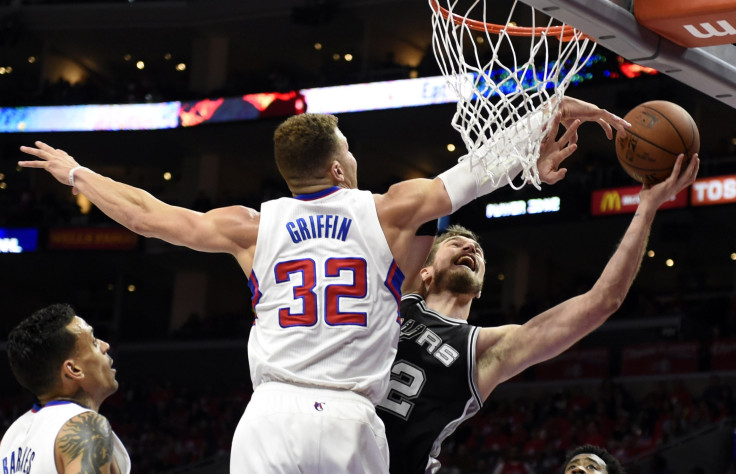Why The NBA Wishes the Eastern Conference Wasn't So Terrible

During the third quarter of Sunday night’s game between the Los Angeles Clippers and the San Antonio Spurs, Blake Griffin dropped not one, not two, but three Twitter-crushing dunks on the head of Spurs backup Aron Baynes.
At least, they might have done that, if anybody on the East Coast had been awake to see them.
The NBA Playoffs have so far been a disappointment for TV audiences; overall ratings for ESPN/ABC were flat compared to 2014, and TNT’s ratings were down seven percent from where they were last year. Why? Partly because of blowouts and partly because many of the most intriguing matchups, including the Clippers-Spurs contest, tipped off close to 11:00 PM Eastern, after most working adults had gone to bed.
These structural problems have plagued the NBA for years, and there are a number of proposals on the table to fix them. Some are more modest, like a plan that would guarantee playoff berths to the league’s six division champions, and seed the remaining ten teams based on their regular season records. Others, like SB Nation columnist Tom Ziller’s plan to move the league from six divisions to five, or Grantland editor-in-chief Bill Simmons’s self-described “Entertaining as Hell Tournament,” which would throw the bottom half of the league into a single-elimination tournament for the eighth seed, are more radical.
Earlier this year, NBA League Commissioner Adam Silver intimated that change was in the offing. “My first year I was studying a lot of these issues and year two is time to take action,” Silver told Comcast SportsNet Bay Area back in February.
Yet all of these proposals face significant logistical, structural and business challenges. Chief among them is doing right by the league’s broadcast partners, who have shelled out hundreds of millions of dollars for the right to broadcast the NBA’s games. “They have this constraint of not wanting to have games on at the same time,” said Stephen G. Bronars, a senior economist at the Welch Group. “They're going to sell the rights for more if they can guarantee that the ESPN game is not going to conflict with the game on TNT.”
That leaves the league with a lot of games to air one at a time. Sixteen of the league’s 30 teams qualify for the playoffs, and each round can last up to seven games. Giving west coast games more favorable time slots in the hunt for ratings could extend the playoffs, which its fans already call the second season, too long.
“I think they've already dragged it out as long as they can by not having these games go head to head,” Bronars added. “There's a limited number of times you're going to be able to put these west coast games on.”
There is also the problem of entrenched competitive imbalance. As Ziller has pointed out before, the NBA’s Western Conference has now dominated its Eastern counterpart for 14 straight years, a problem that’s not easily overcome in a sport like basketball, where a concentration of talent leads to extended periods of dominance. No matter how much restructuring takes place, it’s likely that west coast teams will continue to be matched up against one another in early rounds, leaving east coast fans trying to decide how important a good night's sleep really is.
Yet perhaps the greatest hurdle Silver faces is a legislative one. Though he’s styled himself as a reformer since taking over for David Stern, Silver ultimately works for the NBA’s 30 franchise owners, many of whom are attached to the current system and its attendant traditions and rivalries. Silver will need a super majority, or two-thirds, of the owners to approve any proposed change to the playoff system.
Though he's styled himself as a reformer and taken bold stances on legalized gambling and ads on jerseys, Silver sounded much less excited about the prospects of imminent change to the playoffs format after a board of governors meeting held earlier this month. "The result, I would say, is inconclusive about where we should ultimately go," Silver said.
© Copyright IBTimes 2024. All rights reserved.





















